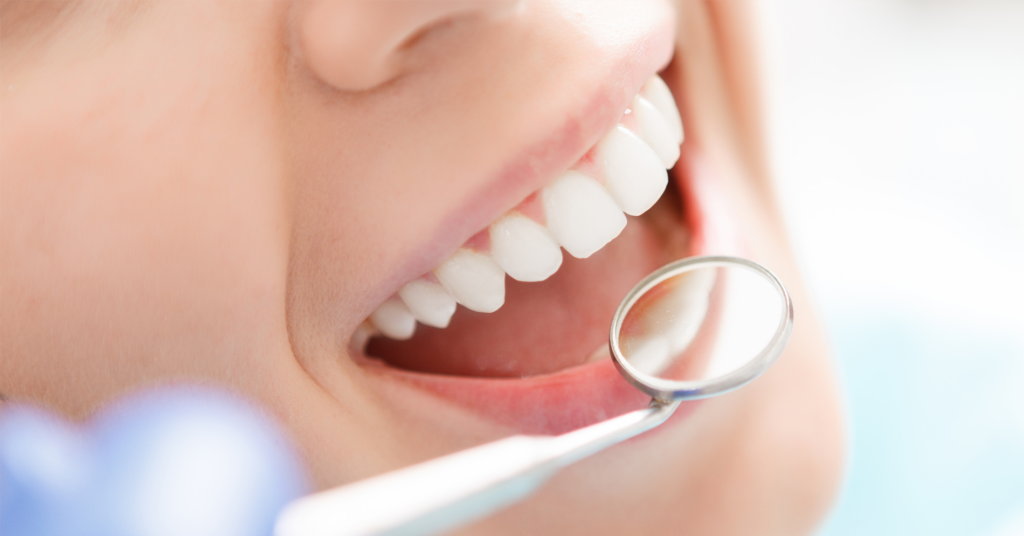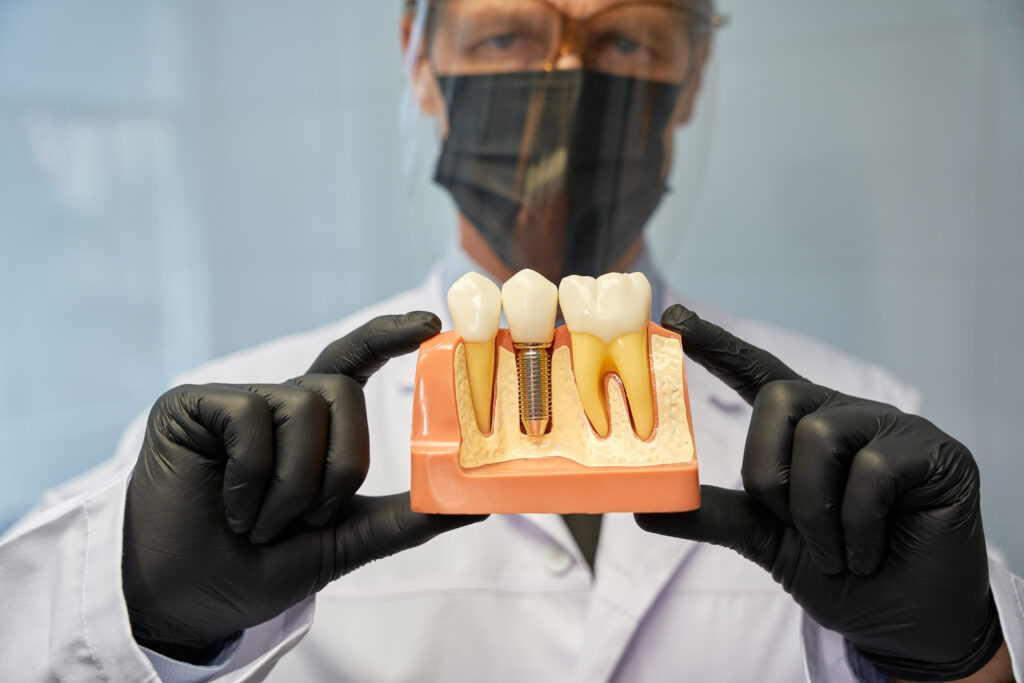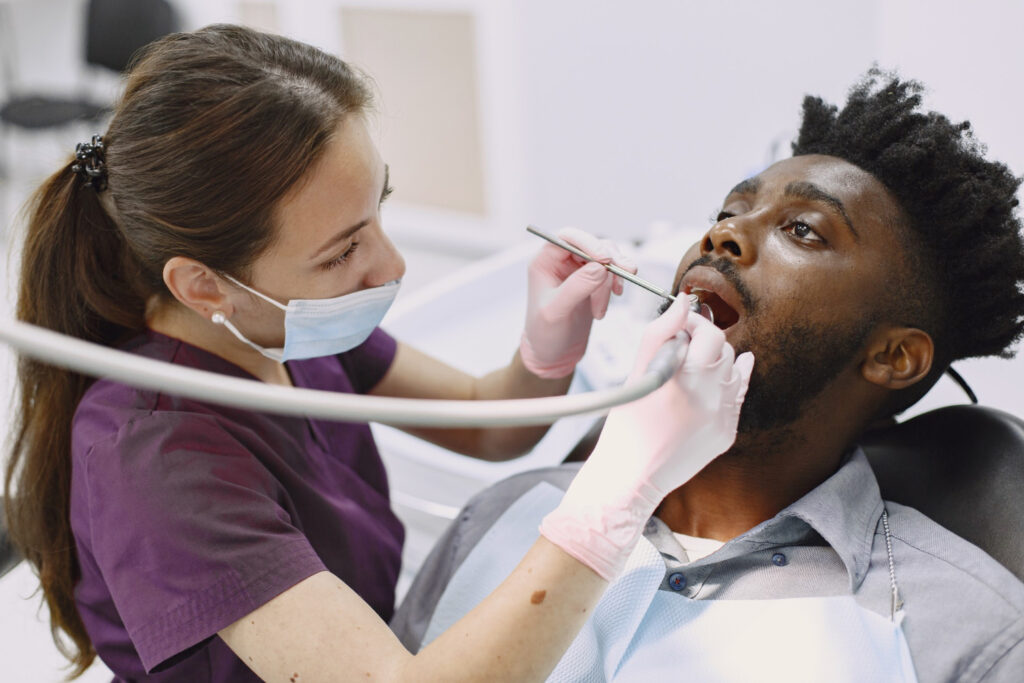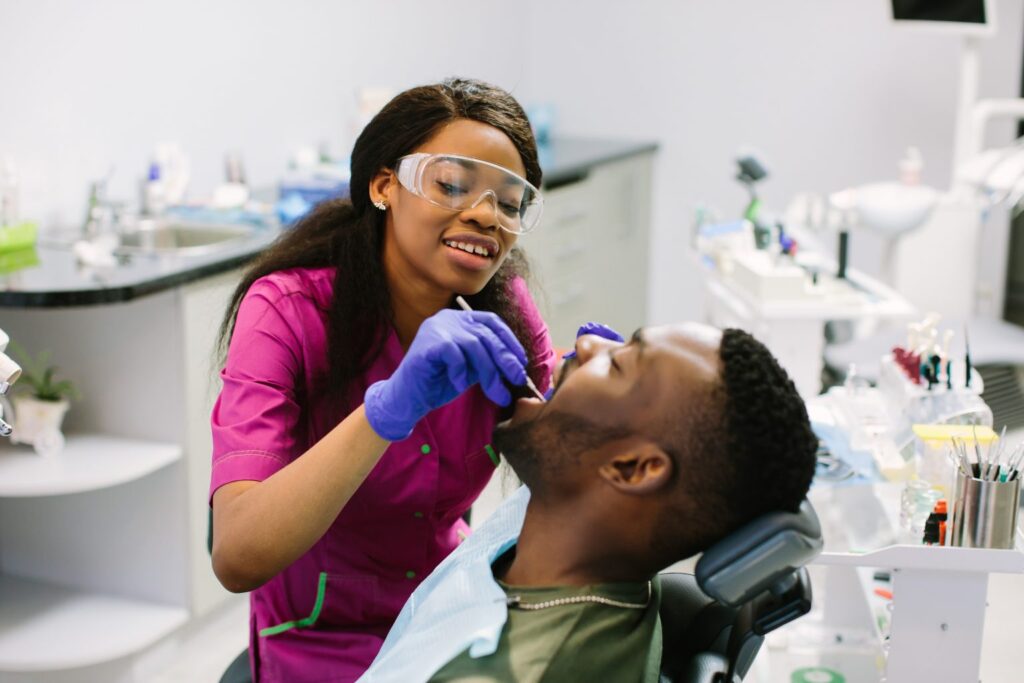
Dental implants have revolutionized the field of cosmetic dentistry, providing a durable and natural-looking solution for missing teeth. However, dental implant surgery requires a certain recovery period, like any surgical procedure.
This article explores the dental implant healing stages and the average dental implant recovery time, as well as tips to speed up the healing process.
Dental implants are screw-shaped metal posts that serve as artificial tooth roots for those whose teeth have fallen out or been removed. It connects the jawbone to secure itself in place. Then, a cap that looks like a tooth is placed over the top, resulting in a realistic-looking artificial tooth that lasts for a lifetime when cared for properly.
What Is Dental Implant Surgery?
Dental implants are screw-shaped metal posts that serve as a type of implant or artificial tooth roots for those whose teeth have fallen out or been removed. The entire process involves securely connecting the implant to the jawbone. After this, a cap that mimics the appearance of a natural tooth is placed over the top. This type of implant, when cared for properly, can result in a convincingly realistic-looking artificial tooth that lasts a lifetime.
The prospect of dental implant surgery might seem overwhelming, particularly considering it involves having a metal post inserted into your jawbone. However, this type of implant procedure is surprisingly safe, has fast recovery times, and results in a restored smile so convincing that people would never notice.
What Is the Normal Healing Time for Dental Implants?
The healing time for dental implants, often called dental implant recovery, can vary considerably based on several factors, including the number of implants placed and whether supplemental procedures such as bone or tissue grafts were necessary.
Generally, the initial healing phase lasts about 1-2 weeks, during which discomfort and swelling gradually fade. Subsequently, the implant post requires a dental implant recovery period of about 3-6 months to fully meld with the jawbone in a process known as osseointegration.
Following this is the abutment placement, which usually has 1-2 weeks of recovery. Full dietary habits can typically be resumed after about 7-10 days if no complications occur during dental implant recovery.
However, it’s crucial to note that each patient’s dental implant recovery journey is unique, and for some, it might take up to eight months to fully recover from a dental implant procedure.
What to Expect During Dental Implant Surgery Recovery
0-24 Hours After Surgery
Immediately after dental implant surgery, it is expected to experience bleeding from the implant site. Your dentist will provide you with gauze pads to place over the area to help control bleeding. Biting gently on the gauze pads is essential to allow a blood clot to form and promote the healing process. It is normal to have discomfort, swelling, and bruising during this time. Applying an ice pack to the outside of your face in the affected area can help reduce swelling and alleviate discomfort.
To minimize pain, your dentist may recommend prescription pain medication or counter pain medication. Following the prescribed dosage and instructions is crucial to manage pain effectively. Your dentist may also prescribe antibiotics to prevent infection during the initial healing phase.
To promote proper healing, it is essential to maintain good dental hygiene. However, you should avoid brushing the surgical site for the first 24 hours to prevent disturbing the blood clot. Instead, rinse your mouth gently with a saltwater solution or an antimicrobial mouthwash as instructed by your dentist.
1-3 Days After Surgery
The bleeding should subside as the first day passes, and the swelling should gradually diminish. You may continue to experience some discomfort and minor swelling during this time, but it should start to improve. Follow any dietary restrictions and consume only soft, cold, or lukewarm foods to prevent irritating the surgical site.
Rinsing your mouth with salt water or an antimicrobial mouthwash after meals and before bed can help keep the area clean and aid in healing. It is essential to avoid smoking and consuming alcohol during this phase as they can hinder the healing process and increase the risk of complications.
1-2 Weeks Post-Surgery
By the end of the first week after the dental surgery, most patients can resume their daily activities and return to work. The gum tissue around the implant site will continue to heal and may feel less tender. Your implant dentist will typically remove any stitches placed during surgery at this stage.
It is important to continue practicing a good oral hygiene routine during this time. Brush your teeth gently using a soft-bristle toothbrush, avoiding the surgical area. You may be given a special mouth rinse as advised by your dentist. Stick to a soft diet and avoid hard, crunchy, or spicy foods that could disrupt recovery.
3-6 Months Post-Surgery
This is the critical phase of the dental implant healing process. Over the next three to six months, the titanium post, also known as the implant fixture, will gradually fuse with the jawbone through a process called osseointegration. This integration provides a solid foundation for the dental restoration to be placed later.
During routine check-ups, your dentist will monitor the progress of osseointegration and ensure that healing is occurring as expected. Once the implant has fully integrated with the jawbone, the next steps can be initiated, such as taking an impression for the final restoration and attaching the artificial tooth.
Tips for a Speedy Dental Implant Recovery Time
- Maintain Good Oral Hygiene. Maintaining excellent oral hygiene is crucial, particularly when considering dental implant placement. Regular brushing, flossing, and professional cleanings can prevent infection while promoting quicker healing after implant placement. This aids in enhancing the overall success and longevity of the dental implant.
- Stay Hydrated. Drinking plenty of water can aid in the healing process by keeping your mouth and body hydrated. This can also help prevent dry mouth, slowing down the tooth implant recovery time.
- Eat Soft Foods. Softer foods are easier on your mouth during the initial recovery period. Gradually move to solid foods or your regular diet as your comfort level increases.
- Avoid Strenuous Activities. Heavy physical activities can increase blood flow to your mouth and prolong the recovery process.
- Use Ice Packs and Warm Compresses. Ice packs can help reduce swelling, while warm compresses can alleviate discomfort.
- Follow Your Dentist’s Instructions. Your dental specialist will provide detailed instructions and prescribe medications for post-operative care. Following these guidelines can significantly speed up your recovery.
- Avoid Hot Foods and Beverages. Hot foods and beverages can increase blood flow to the surgical area, potentially leading to more swelling and discomfort. Stick to cooler or room temperature options during the initial recovery period.
- Use Pillow Support. Place a soft cushion or pillow between your jaw bone and other body parts while resting or sleeping. This can help minimize pressure on the surgical area and improve your overall comfort.
- Avoid Touching or Irritating the Surgical Ste. Refrain from touching the surgical area with your fingers, tongue, or any other objects. This can introduce bacteria and slow down the healing process. Also, avoid playing with any stitches or irritating the area with excessive rinsing or swishing.
- Attend Follow-Up Appointments. Schedule and keep all follow-up appointments with your dentist or oral surgeon. They will assess your healing progress, remove any stitches if necessary, and provide further guidance specific to your recovery.
Reach Out to My Absolute Smile to Learn More About Implant Dentistry
Although an invasive procedure, dental implant surgery is a proven solution for replacing missing teeth, with a high success rate. While the dental implant healing time may seem lengthy, remember that good things take time. With proper care and patience, your new implants will soon feel just like your natural teeth.
Ready to restore your confident smile? Contact us at My Absolute Smile today to schedule your dental exam. Our team of experienced professionals is committed to helping you achieve the beautiful smile you’ve always wanted.







